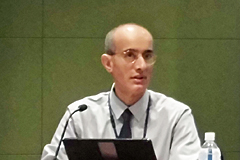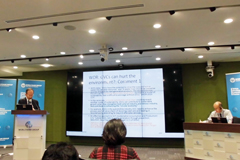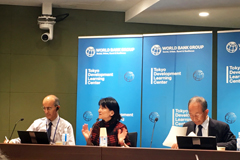What Benefits and Challenges Does a Global Value Chain Bring to the World? World Development Report 2020 Seminar Held
2019.12.23
On Nov. 25, 2019, the World Bank Group and the JICA Research Institute (JICA-RI) cohosted the seminar “World Development Report (WDR) 2020: Trading for Development in the Age of Global Value Chains.” Speakers from JICA-RI included Director Izumi Ohno and Senior Research Advisor Akio Hosono.
The World Bank Group has released the WDR annually since 1978. The WDR is a compilation of analyses of important current issues and related policy recommendations. The theme of the 2020 edition of the WDR is "Trading for Development in the Age of Global Value Chains." It addresses the benefits and problems brought to the development of developing countries by a global value chain (GVC).
Aaditya Mattoo, co-director of the WDR 2020 and chief economist for the East Asia and Pacific Region of the World Bank gave the keynote lecture at the seminar, including an overview of the report. Mattoo pointed out that one way a GVC differs from conventional trade is that it promoted a structure that creates products through hyper-specialization. He explained that, because companies participating in the GVC can increase their specialization in a specific parts components or technology, they acquire the ability to compete in the international market in that area. In addition, the transaction that takes place in GVC creates firm-to-firm relationships, so it is possible to create lasting relationships if the business goes well. Due to these characteristics, productivity improves and employment expands when small and medium-sized companies in developing countries participate in the GVC, leading to reduced poverty. Mattoo raised Vietnam as an example, where some regions participating in GVC are seeing a faster decrease in poverty than those not participating.

Aaditya Mattoo, co-director of the WDR 2020 gave the keynote lecture
Meanwhile, the competition to obtain investment from excellent global corporations has intensified, leading to inequality and other problems between the developed world and developing countries. Mattoo also pointed out that, although the expansion of the GVC has increased the number of female laborers, it has not become a force toward breaking through the "glass ceiling," and gender inequality within firms has been an issue. In addition, Mattoo touched on the adverse effect on the environment from higher carbon dioxide emissions resulting from increased transportation between multiple countries, saying that market alone won’t generate a progress and we need to cooperate beyond trade.
After the keynote lecture, Hosono commented on the impact of a GVC on the environment. He mentioned that the WDR 2020 addressed the "circular electronics value chain," that uses waste in the electronics industry (e-waste). He said that it is a model of sustainability and we should deepen related research and make a circular economy a mainstream. In addition, he introduced the examples of a Japanese company that engages in the used automobile parts export business and of a cooperative established by Japanese immigrants that promotes agro-forestry in Tomé-Açu, Brazil as efforts in enhancing circular economy and green economy through value chains. Further, Hosono said that because it is becoming more difficult for the small and medium-sized companies in developing countries to participate in the GVC, it is necessary to strengthen the link between the global companies placing orders and the local supply chain, creating systems in which not only companies, but also governments, NGOs and a variety of other actors, can collaborate.

Senior Research Advisor Akio Hosono commented on the impact of a global value chain on the environment
Yasuyuki Todo, professor at Waseda University, also participated in the discussion via teleconferencing. He gave praise, saying that the WDR 2020 comprehensively analyzes the GVC, and gives extremely important suggestions regarding the current world economy. He then pointed out issues not addressed in the WDR 2020, such as the increase of anti-globalization due to expansion of the GVC, and the restrictions on exports, overseas investment and the transfer of technology, due to security concerns.
Ohno served as moderator in the panel discussion that followed, in which she raised the question of whether the policy space that makes it possible for the governments of developing countries to develop and expand industry is shrinking with the current increased impact of global corporations. During Q&A, questions from those in attendance included "Is it the right decision for developing countries that have limited industries, such as in Africa, to participate in the GVC?" and there was a lively exchange of opinions.

Director Izumi Ohno served as moderator in a panel discussion

事業事前評価表(地球規模課題対応国際科学技術協力(SATREPS)).国際協力機構 地球環境部 . 防災第一チーム. 1.案件名.国 名: フィリピン共和国.

事業事前評価表(地球規模課題対応国際科学技術協力(SATREPS)).国際協力機構 地球環境部 . 防災第一チーム. 1.案件名.国 名: フィリピン共和国.

事業事前評価表(地球規模課題対応国際科学技術協力(SATREPS)).国際協力機構 地球環境部 . 防災第一チーム. 1.案件名.国 名: フィリピン共和国.

事業事前評価表(地球規模課題対応国際科学技術協力(SATREPS)).国際協力機構 地球環境部 . 防災第一チーム. 1.案件名.国 名: フィリピン共和国.

事業事前評価表(地球規模課題対応国際科学技術協力(SATREPS)).国際協力機構 地球環境部 . 防災第一チーム. 1.案件名.国 名: フィリピン共和国.
scroll